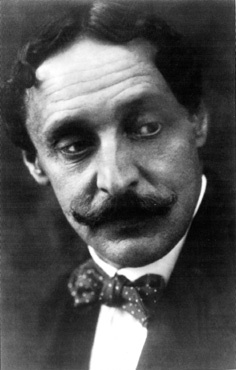Yevgeni Bauer (Yevgeni Bauer)

Motion Picture Director. He and Yakov Protazanov were the most important Russian filmakers of the Czarist era. Yevgeni Frantsevich Bauer was born in Moscow, into an artistic family of German descent. He graduated from the Institute of Painting, Sculpture, and Architecture in 1887. Restlessly creative, he was an actor, newspaper cartoonist, and theatre producer before entering films at 48, a relatively advanced age for that activity. His first credit was as art director for the feature “The Tercentenary of the Romanov Dynasty” (1913), and he made his directing debut that same year. Most of his sadly brief career was spent at the Khanzhonkov Studio, of which he became a major shareholder. Unlike his versatile rival Protazanov, Bauer dealt exclusively with contemporary subjects and his penchant for depicting obsessive psychology and (discreetly handled) social injustice put him in allegiance with the “decadent” Russian Symbolists of the era. He designed and lit his own sets but there’s nothing stagy about his cinematic approach; his deep focus technique, developing the action in long takes within the frame, anticipated director William Wyler’s style by a quarter-century. Of the estimated 70 films he made 26 survive, among them “Twilight of a Woman’s Soul” (1913), “Life in Death” (1914), “A Child of the Big City” (1914), “Silent Witnesses” (1914), “Daydreams” (1915), “After Death” (1915), and “The Dying Swan” (1917). Many of these starred screen idol Vera Kholodnaya, a Bauer discovery. “The Revolutionary” (1917), produced immediately after the fall of Nicholas II, was the first Russian motion picture to deal with the nation’s turbulent political realities, the outcome of which the director would not live to see. In the spring of 1917 Bauer broke a leg in an accident while scouting locations in the Crimea; he directed his final effort, “The King of Paris”, from a wheelchair, but medical complications set in and he died of pneumonia at 52. He was buried at the Old Yalta Cemetery (now Polikurovskoe Cemetery). Banned for many years under the Soviets, Bauer’s extant work has recently been restored and acclaimed by a new generation of movie buffs. (bio by: Bobb Edwards)
Born
- January, 22, 1865
Died
- June, 06, 1917
Cemetery
- Polikurovskoe Cemetery
- Ukraine

